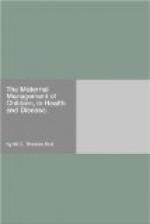THEIR VALUE AND IMPORTANCE.
It would seem almost unnecessary to say a word upon so self-evident a truth, and yet perhaps the full extent of this statement is not generally appreciated. It has not, perhaps, occurred to the minds of all, that upon the right position and arrangement of the teeth the beauty and expression of the countenance much depends. But so it is; for however regular and perfect the general features, if the teeth are irregular or deficient, an unpleasing expression, proportionate to the extent of the displacement, is inevitably produced. Now every mother should be alive to this fact, that she may early apply to the dentist to have any error of the above nature rectified, before it is too late.
On their complete and entire state also depends the perfection of utterance and articulation. The child, for instance, makes no attempt at articulation until it has acquired several teeth; this faculty becomes also exceedingly imperfect during the process of changing them; from this time it continues to improve, until again it is permanently impaired in old age, when they are finally lost. And so again, if a child lose merely a single tooth from the front of its mouth, lisping will result; or if a supernumerary or irregular tooth be present, the articulation will be abrupt and imperfect:—the former plainly showing the importance of the entireness of the series, and the latter, the necessity of regularity in their arrangement and position.
The teeth, however, are chiefly important in relation to the part they sustain in connection with digestion, viz. the mastication of the food. By this act the food, after being received into the mouth, is mixed with the saliva and broken down, till it becomes of an uniform pulpy consistence, fit for being easily swallowed, and acted upon by the gastric juice on its arrival in the stomach. That due mastication of the food is essential to healthy digestion, which will be promoted or retarded in exact proportion as




